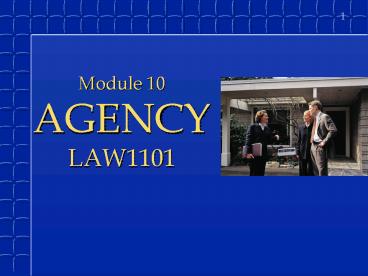Module 10 AGENCY LAW1101 - PowerPoint PPT Presentation
1 / 23
Title:
Module 10 AGENCY LAW1101
Description:
What is the authority of an agent? What are the duties of an agent? ... Panorama Developments (Guildford) Ltd v Fidelis Furnishing Fabrics Ltd ... – PowerPoint PPT presentation
Number of Views:77
Avg rating:3.0/5.0
Title: Module 10 AGENCY LAW1101
1
Module 10AGENCYLAW1101
2
AGENCY SUMMARY
- What is an agent?
- How is an agency created?
- What is the authority of an agent?
- What are the duties of an agent?
- What are the rights of an agent?
- Liability in agency law
- Termination of an agency.
3
AGENCY SUMMARY
- What is an agent?
- How is an agency created?
- What is the authority of an agent?
- What are the duties of an agent?
- What are the rights of an agent?
- Liability in agency law
- Termination of an agency.
4
ESSENTIAL PRINCIPLES
- MEANING OF AGENCYAgency is a fiduciary
relationship where one, the agent, is authorised
to bring the other, the principal, into legal
relations with a third party
PRINCIPAL
THIRD PARTY
AGENT
Often Contract
5
WHEN IS AN AGENT NOT AN AGENT
- Selling agent
- International Harvester Co of Australia Pty Ltd v
Carrigans Hazeldene Pastoral Co - Employer/Employee/ Independent
contractor
6
CREATION OF AGENCY
- Express Agreement
- Implied Agreement
- Emergency
- Great Northern Railway Co v Swaffield but not
Sachs v Miklos - Married women
- Cohabitation
- Agency by Estoppel or Holding Out
- Lucken v Buckeye Parking Corp
- Ratification
7
AUTHORITY OF AN AGENT
- Actual
- Express and
- Implied
- ANZ Bank Ltd v ACEC
- Apparent or Ostensible
- Panorama Developments (Guildford) Ltd v Fidelis
Furnishing Fabrics Ltd - Freeman Lockyer v Buckhurst Park Properties
(Mangal) Ltd
8
DUTIES AND RIGHTS OF AGENTS
- DUTIES OF AGENT TO PRINCIPAL
- To follow instructions - Mitor Investments
- Not to exceed authority
- To use reasonable diligence skill and care -
Chaudhry v Prabhakar - Fiduciary duty (act in good faith)
- Not to make a secret profit or take a bribe
- Avoid conflicts of interests
- Not misuse confidential
- Act in person
- Keep accounts
9
DUTIES AND RIGHTS OF AGENTS
- DUTY OF PRINCIPAL TO AGENT
- right of agent to remuneration
- right of agent to indemnity
- right of lien
10
LIABILITY IN AGENCY LAW
- To Third Party
- Breach of warranty of authority
- Other instances
- Principal disclosed
- Anonymous principal
- Agent acting as though principal
11
TERMINATION OF AGENCY
- BY OPERATION OF LAW
- death
- mental incapacity
- bankruptcy
- illegality of subject
- frustration
- dissolution of corporation
12
TERMINATION BY ACTION OF PARTIES
- complete performance
- mutual agreement
- expiration of time
- dismissal
- revocation of As authority -
13
Assessment
- Assignment
- 30 per cent
- Tutorials
- 10 per cent
- Exam
- 9am 6 November 2002
- 60 per cent
14
Exam Outline
- Question 1 is on Module 5 - Criminal law and will
be comprised of a problem question and a short
essay question. - Question 2 is drawn from Module 10 - Principal
and Agent and will be a longer problem question. - Question 3 will be problem questions drawn from
the Contract Law section - Modules 7-9. - Question 4 comprises two problem type question on
Torts - Module 6 - Question 5 will be more problem questions on
contract Modules 7-9
15
Timing
- 10 minutes perusal 3 hours exam time
- 35 minutes per question
- Allot time within questions according to their
worth - 3 minutes per mark
16
Exam Preparation
- Open Book
- See Selected Reading 1.1
- Summaries under module and topic headings
- Make sure elements or tests listed
- Note cases for principles of law
- Make sure you know and can use the key terms
17
Exam Preparation
- Test yourself especially with problem questions
and timing of answers - You must still know the work
18
The Exam - Using Perusal Time
- Read the paper
- Divide your time-should be done before
- Decide order
- Note issues in problem question
- Note points on short essay
- Commence plans of problem questions
19
Short Answer/Short Problem
- Directive words
- List, Describe, Explain, Outline, Distinguish...
- Bullet points or headings as appropriate
- Cite cases especially if specifically requested
- Length does not equate with quality
- Will generally not require regurgitation of facts
- More likely to compare or discuss
- Mainly problem questions this year
20
Problem Questions
- Read the question carefully more than once
- Identify issues
- Plan answer
- Dont restate the facts
- ILAC is useful to keep answers on the track
- BUT
- It may be useful to deal with issues separately
or if an issue is easily able to be disposed of
21
Problem Questions (contd)
- Cases used as authority for principle of law
- Cases also used if their facts are quite similar
to those in the problem - There may be no obviously RIGHT answer so
accurate statement of the law and logical
application of it to the facts required - Make sure you have answered the question eg
Advise... What remedies... - In your conclusion the advice may be qualified
by some need for further information or
uncertainty about the precise application of the
law
22
General Presentation
- Number answers clearly
- Mark numbers on the front of the answer booklet
clearly - Case names and statutes underlined
- TIMING
- TIMING
- TIMING
23
After the Exam
- Celebrate
- Receive HD, A ......
- Celebrate again
- Ritual note burning or enrol in a law degree

